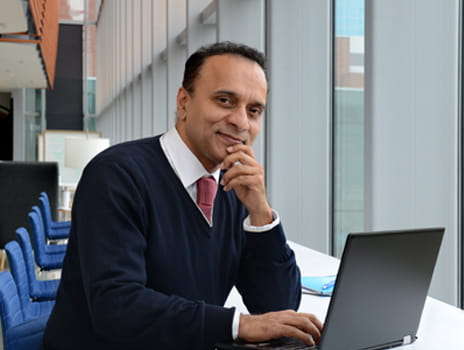July 19, 2021
As technologies evolve and become more sophisticated, the increased application of artificial intelligence (AI) in healthcare holds great promise.
Prateek Sharma, MD, a gastroenterologist and member of The University of Kansas Cancer Center’s Cancer Prevention and Control research program, recognizes and welcomes the budding potential of AI in his field. He is chair of the American Society for Gastrointestinal Endoscopy (ASGE) AI Task Force. Per the ASGE, the task force is charged with “proactively engaging the society, profession and industry in the rapidly evolving arena of artificial intelligence.”
“AI has been around for a while, and there have been recent advances in fields including radiology and dermatology, but not in the fields of gastroenterology and endoscopy,” Dr. Sharma said. “The task force was created because there is a major opportunity to apply AI to the treatment of diseases affecting the gastrointestinal tract.”
A different kind of bench
The term “bench to bedside” describes the process of taking discoveries from the laboratory to the clinic so that patients may directly benefit. At The University of Kansas Cancer Center, basic scientists regularly partner with clinicians to advance lab breakthroughs.
“Our advances in AI are like our traditional bench to bedside approach. In the case of AI, algorithms and machine learning discoveries come from a computer laboratory bench rather than a traditional lab team studying microbiology, for example,” Dr. Sharma said. “Now we are seeing these bench concepts arrive at the patient’s bedside.”
In April 2021, the U.S. Food & Drug Administration (FDA) approved the first device that uses artificial intelligence to help detect potential signs of colorectal cancer. The device uses AI based on machine learning to assist clinicians in detecting precancerous or cancerous polyps in the colon in real time during a colonoscopy. Colorectal cancer is the third most common cancer in the U.S but it is largely preventable with regular screenings like colonoscopies. With both the device and clinician on the lookout for suspicious lesions, colorectal cancer may be caught earlier when it is easier to treat.
This new device is just the beginning. Scientists, including Dr. Sharma, are exploring ways to apply similar devices to use during common screening procedures. He is involved in two studies looking at the use of AI in the detection of lesions in the colon. Another study focuses on the detection of flat polyps in the colon, which are more difficult to detect compared to raised polyps. Because of this, flat polyps are believed to be the culprit for most cases of colorectal cancers that occur in people who are up to-date with their colonoscopies. Use of AI during the procedure could improve diagnoses.
“It is like having an extra pair of expert eyes in the room during the procedure,” Dr. Sharma said.
Dr. Sharma is also in the early stages of a study integrating AI into endoscopies to better characterize Barrett’s esophagus, a potential complication of chronic acid reflux that may put individuals at increased risk for developing esophageal cancer.
“The study will determine AI’s effectiveness in helping differentiate and characterize the stages of dysplasia in Barrett’s esophagus. What we find, whether it is precancer, high-grade dysplasia or early cancer, may help determine treatment approach,” Dr. Sharma said.
The future of AI
Each year, the ASGE hosts its Artificial Intelligence Summit, convening experts across the globe to discuss the future of AI in gastroenterology. Representatives from all sectors, including computer scientists from major technology companies such as Microsoft, clinicians, the FDA and the National Institutes of Health participate – a “truly multidisciplinary conference,” according to Dr. Sharma.
The ideas that come from these collaborations will lead to better ways to treat and diagnose cancer earlier. Proven cancer screening methods like endoscopies and colonoscopies will only get better with the use of AI.
“If someone had told you five years ago that a machine would help physicians find polyps, what would you think? We’d all be surprised,” Dr. Sharma said. “The future is here.”
